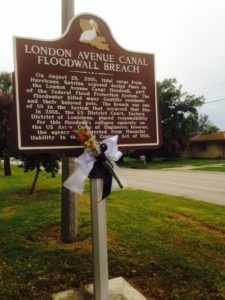
Historic plaque at the London Avenue Canal on Aug 29, 2014. Photo credit/unknown
A version of this opinion piece by Sandy Rosenthal, founder of Levees.org, also appeared on NOLA.com on Thursday August 10, 2017.
Last week, Ms. Corinne Zimmerman, a New Orleans resident who lives by the 17th Street Canal breach site, called me. She was one of 125,000 residents and businesses on the East Bank of Greater New Orleans who had just received a check in the mail.
Ms. Zimmerman – whose husband drowned twelve years ago when the levees broke during Hurricane Katrina – wanted to know why she was receiving a check for $400 and did this mean that the Orleans Levee Board was admitting they were responsible.
I took a deep breath, and explained that her check was part of a $20 million settlement with three local levee districts – Orleans, East Jefferson, Lake Borgne Basin and also the East Flood Authority.
I told her it wasn’t an award for damages. Federal Judge Stanwood Duval actually determined in 2008 that the US Army Corps of Engineers was responsible for the 17th Street Canal breach. However, the corps was immune from liability due to the Flood Control Act of 1928.
The checks might appear to be a sort of victory. They might appear that someone has finally admitted fault, or partial fault, for the 2005 levee breaches.
But these checks come from a settlement. And in a specific case like this, a settlement is not evidence of wrongdoing. Furthermore, a judge does not have to believe a plaintiff’s claims have merit to approve a settlement.
The settlement money came from insurance proceeds resulting from policies the levee districts held on the levees. So, if the districts aren’t guilty, one might certainly wonder why the insurance companies would pay. Here’s why.
Insurance companies have a risk of being found in bad faith for refusing a bona fide settlement offer within or at policy limits. Explained more simply, if an insurer refuses to pay a proposed settlement, they could potentially become liable for the full amount of any future settlement or a judgment – even if it exceeds their policy limits.
The total damages due to the levee and floodwall failures was many billions of dollars. In this case, the insurers each had the choice to pay $5 million or roll the dice and possibly end up bankrupt.
If the insureds win, they save the insurance proceeds minus the legal expenses of a trial. And if they lose, the insurer could potentially face a possible bad faith judgment for billions of dollars.
It’s not hard to see why a rational insurer would settle even if they believe the allegations have no merit.
Now let’s look at this from the standpoint of the plaintiffs.
The $20 million awarded is a pittance compared to the claimed damages due to the corps’ levee building mistakes. If the plaintiffs believed they had such a good case, would they have settled for so little given the reported vast assets of the levee districts?
Well, the answer to that is “maybe.” The attorneys for the plaintiffs get paid from a $20 million award. Going to trial will cost them a fortune. And if they win, will they really be able to seize assets from the levee districts? Probably not.
So, a rational attorney might settle for $20 million even if they had a strong case. In other words, in a case like this, the settlement reflects legal strategy on the part of both defendants and plaintiffs.
In closing, it’s not hard to see why folks who are not attorneys or insurance agents might consider a settlement an admission of guilt either wholly or partially.
I explained all this to Ms. Zimmerman. She asked me, “Is this it? It’s over? Maybe I shouldn’t cash this check?”
I advised her to cash the check, and spend it in a way her deceased husband would approve.
Fighting back my own tears, I reminded her that she had done everything in her power. She had done the responsible thing, namely, she filled out the proper claim form many years ago.
Judge Duval’s 2009 settlement in the class action lawsuit against the levee districts is neither proof of culpability nor acceptance of responsibility by the pre-Katrina levee districts. It’s a settlement, and nothing more.





i can not locate my check.i do have a conformation number.which is pq7fdnsj.if at all possible could you help in locating this check.